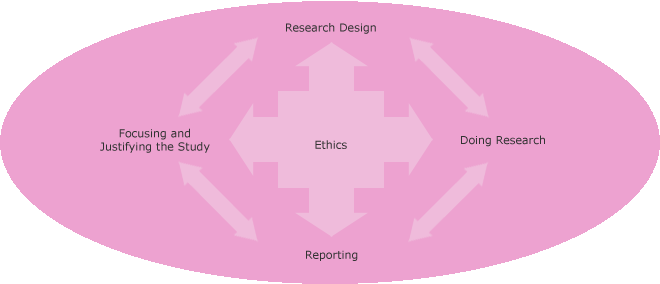Research Process
Scientific research is a creative process proceeding in stages. The process usually follows a certain pattern, in which the researcher proceeds from forming a focus for the study to reporting on the conducted research. The sequence of stages below presents a basic example of the research process.
The different stages of the process function interactively together. Any stage in the process may have an effect on, by specifying and transforming, the next stage but also on the previous stage. Nevertheless, the process is ongoing.
You start the research process by choosing a broad research topic, selecting a particular phenomenon and, with the help of research literature you need to justify your research. You next formulate the knowledge you have gained from the research literature into your research plan. Creating a research plan is a key stage of the research process in which you need to mention the orientations, the methods of research, data collection and data analysis in detail. Your research plan will guide how you do your research and can even transform or improve the research process. Once you have collected and analysed your data, you need to report (write up your research report) on the results. Your research report will obey the principles of scientific writing with the goal of clarifying the stages of the research and arguing the validity of the research results. Throughout all the stages of the research process you need to be taking, in an organised way, notes in one format or another: making notes, writing comments to a note book, writing down research ideas, writing your research plan, writing up your analysis, and writing the research results into your research report. At the end of your research report, you need (it is not obligatory, though) to formulate and present new research questions, which would enable you and other researchers to carry the research of your selected phenomena forwards. Please note that these new research questions must be a direct result of your research.
During the research process, new research problems or research questions may rise from the data. You can do scientific research in a variety of formats. The format of Stages 1-4, which we present, is a basic, highly adaptable framework, into which you need to include your selected orientation(s) of the philosophy of science and your methods of data collection and analysis. Every methodological choice affects each stages of the process.
You need to consider ethics throughout the research process. Ethics essentially means you follow and obey the practices, as accepted by the scientific community, of good scientific research.
Follow the links below to more details.

